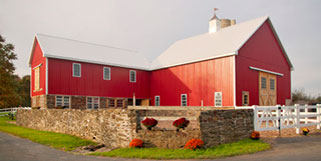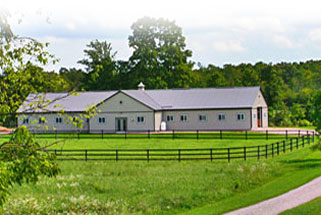Real estate agents and sales professionals require effective replacement valuation tools to deliver high-level service to their clients and the Douglas Residential and Agricultural Cost Guides are vital to success.
Both resources have emerged as gold standards in their respective sectors and real estate crosses over into each. Industry leaders recognize that the Douglas Cost Guides provide a baseline for stakeholders to arrive at mutually agreeable and accurate replacement cost value estimates. The Douglas Cost Guides are the result of diligent, ongoing analysis, and three decades of field experience.
How do the Douglas Cost Guides Benefit the Real Estate Industry?
It’s not uncommon for potential buyers to consider residential property improvements and agricultural expansions. Rarely does an existing home or agricultural use structure perfectly align with the next owner’s vision.
That’s why an increased number of salespeople are showing properties that would be perfect if they underwent renovations or added living space. The challenge continues to be having hard numbers to help buyers get the home they want and feel financially secure. That’s why sales professionals are using the Douglas Residential and Agricultural Cost Guides to get accurate replacement cost estimates so that their clients can realize their dream of acquiring the property they desire.
Accurately Estimate the Value of Renovations for Potential Home Buyers
Scenarios in which bathrooms lack the desired size or a home needs an additional room to accommodate growing families sometimes result in lost sales. Although a real estate agent can discuss theoretic ideas about a property’s potential, buyers typically prefer hard data. The idea of buying what they consider an “unfinished” home can be much more palatable if they have reliable renovation estimates in hand. That’s why the Douglas Residential Cost Guide replacement valuation tool has made such a substantial difference in terms of real estate sales.
Provide Property Cost Valuation Data to Your Clients On-Site
Having the ability to login from any wireless device and open your Douglas Cost Guide account provides real-time access to estimated home improvement numbers. When potential buyers can incorporate reliable replacement cost estimates into their home buying strategy, all parties are well served.
In terms of the sales process, the Douglas Cost Guide provides real estate agents with a hard copy replacement cost valuation manual to use in areas with weak wi-fi reception and an online resource. Each replacement valuation tool provides easily accessible information to accurately calculate the upgrade your client wants in real-time. Simply put, a real estate agent can run the numbers with potential buyers onsite and close a deal.
Calculate Construction Costs to Expand Agricultural Operations
Similar scenarios also exist in the agricultural sector. Purchasing a working farm may require upgrades to make the venture more cost-efficient and profitable. It’s also common for agricultural leaders to envision an expansion of operations. The Douglas Agricultural Cost Guide recognizes that agricultural facilities involve niche construction and the Douglas Cost Guide speaks to its specific factors.
In terms of real estate advantages, laying out the estimated costs of new construction and / or expansion of existing improvements means the difference between moving forward with a transaction or not.
Frequently Asked Questions:
-
How will this benefit my real estate sales?
Working with the Douglas Residential and Agricultural Cost Guides gives real estate professionals a unique cost valuation tool and differentiator. It can be accessed remotely to estimate home improvements and agricultural operations expansions. Providing reliable replacement cost estimates for client consideration expands your services and increases sales.
-
Where and how is the costing data gathered and compiled for the area I work in?
The Douglas Cost Guides are the culmination of more than 30 years of experience by Karl Douglas. His expertise in the agricultural and residential sectors form the basis for actionable valuation information. The replacement cost guides are subject to ongoing updates based on local labour, materials, and other pertinent costs.
-
How easy are the replacement cost calculators to use?
The Douglas Cost Guides were created with the idea that professionals in construction, farming, insurance, real estate, and homeowners could arrive at accurate replacement cost estimates. The Douglas Cost Guides rank among the most user-friendly cost valuation products available for the real estate industry.
-
How detail-oriented are the replacement cost estimators as to what must I gather when I am inspecting a house or farm structure?
One of the primary reasons the Douglas Cost Guides have emerged as a gold standard is because of the attention to detail. Rather than calculate home improvements or agricultural expansions costs based solely on general square-footage, users can include a wide-range of factors to adjust / fine tune the replacement cost estimate to more accurately reflect each specific situation.
-
How often is the costing data updated?
Because the cost of material, labour, and other salient factors shifts, the Douglas cost guides are updated on an ongoing basis to provide the most recent cost changes.
-
How much does it cost to subscribe to the replacement cost guides?
Access to the Douglas cost guides can be purchased at a nominal cost for one-time use up to unlimited valuation packages. Real estate organizations can select a package that cost-effectively serves your needs.
-
Why is replacement cost more than market value?
Replacement Cost New should always be more than market value. Market value is defined as the price that is paid between a willing seller and a willing buyer. If you consider, that as a willing buyer that is knowledgeable about the market, including construction costs – that willing buyer would pay no more than it costs to build a house or structure. When buying, excluding the land cost, they could find a vacant piece of property and build exactly what they want, with all the features that they want, at that same cost.
Typically, when purchasing a property, there are features to the house or structure that are not exactly what the purchaser desires, whether that be a poor layout, small rooms, limited closets, or a dated decor for which the purchaser will have to spend money to bring it to what they are requiring for their own personal needs. This analogy can apply to a livestock enterprise as well, based on size of stalls or pens, flow of livestock throughout the barn, ceiling height, feed handling, manure handling, etc. Replacement Cost should always be more than market value, unless it is a highly motivated purchaser because of location or nearby family or speculation – and then that is not considered as market value.
-
Is Replacement Cost better than Actual Cash Value?
These are two completely different terms.
Replacement Cost New is better, because it will give back to the owner of the residence or structure essentially a new building or house, in the case of a loss, with the same or similar features that they had prior to the loss, without any out of pocket costs to the owner.
Actual Cash Value is taking the estimated Replacement Cost New and depreciating it based on the age and condition of the structure or house. In the instance of Actual Cash Value, following a loss, the insurer and the insured agree on a depreciated or actual cash value of the structure or house. The insurer provides a cheque to the insured for that amount and the insurers responsibility is now completed. The owner or insured will receive no more funds and they are on their own to rebuild whatever they want with the funds they have received, plus additional funds that the owner or insured adds to the project from their own pocket.
-
Doesn’t the real estate appraisal tell me how much my property is worth? Is this sufficient for insurance purposes?
A real estate appraisal should tell you what your property is worth. However, the value reported includes land and improvements, if any. When you remove the land value from the estimated market value, what is left is a depreciated value for the improvements. Depreciation within a real estate appraisal includes:
- physical depreciation
- functional depreciation
- economic obsolescence
When estimating Replacement Cost New for insurance purposes, if you are asking for the improvement to be insured at Replacement Cost New, then the real estate appraisal value would be much too low, as it is a depreciated value. If you are asking for the improvement to be insured at Actual Cash Value, then the real estate appraised value would again be too low, as it includes physical depreciation, functional depreciation and economic obsolescence, whereas for Actual Cash Value, you only want to include physical depreciation in the equation.
If you insure based on a real estate appraisal, then you will be under insured.
The Douglas Cost Guides Can Differentiate Your Process from Other Real Estate Agents
For a real estate agent to sustain long-term success, reputation and repeat business are necessary. The Douglas Cost Guides enhance your customer service repertoire, improve buyer and seller experience, and deliver an unexpected level of professionalism. Utilizing the Douglas Residential and Agricultural Cost Guides is a proactive and sustainable business practice that increases customer retention and repeat sales.





